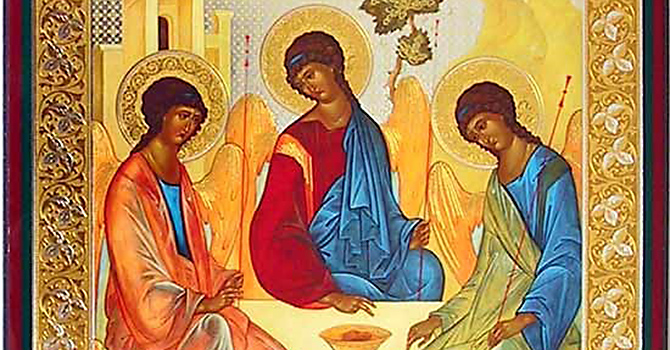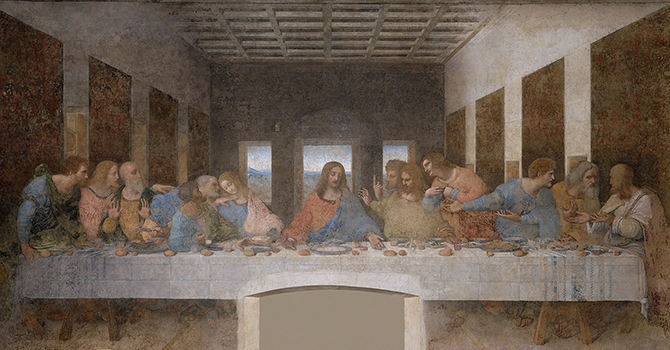
Making Room: Recovering Hospitality As a Christian Tradition
Making Room revisits the Christian foundations of welcoming strangers and explores the necessity, difficulty, and blessing of hospitality today.

“To welcome the stranger is to acknowledge him as a human being made in God’s image; it is to treat her as one of equal worth with ourselves – indeed, as one who may teach us something out of the richness of experiences different from our own.”
— Ana María Pineda
Thoughts and questions to help you consider this practice
None of us ever knows for sure when we might be uprooted and cast on the mercy of others. But how do we overcome our fear in order to welcome and shelter a stranger? The Christian practice of hospitality is the practice of providing a space to take in a stranger. It also encompasses the skills of welcoming friends and family to our tables, to claim the joy of homecoming.
In the Bible, offering hospitality is a moral imperative. God's people remember that they were once strangers and refugees who were taken in by God (Deuteronomy 10:19). How might this memory make someone respond to a stranger or a refugee? What would it mean to "love the alien as yourself" (Leviticus 19:34) in your own community or nation?
The Greek word xenos means "stranger," but also "guest" and "host." From xenos comes the New Testament word for "hospitality": philoxenia means a love of the guest/stranger or enjoyment of hosting guests. Recall a time when you experienced the enjoyment of being a host or when you were the guest of a gracious host.
Do you notice how whenever Jesus shares meals with others, "guests" become "hosts" and "hosts" become "guests"? Contemplate the role reversals that occur in the story of the wedding feast at Cana (John 2:1-11). What happens when Jesus is “hosted” by Zaccheus (Luke 19:1-10)? When Jesus comes as a guest to Martha (Luke 10:38-42), what does he teach her about hosting? How might guests end up as hosts, giving us the gift of their presence? What happens when an act of hospitality not only welcomes strangers, but also recognizes their holiness?
How are strangers welcomed to your neighborhood? To your faith community? Can you identify individuals in your midst who seem to practice hospitality especially well? What do the physical spaces in which you live communicate to strangers and newcomers? How are strangers invited to share their gifts within your home, your workplace, and your congregation? What architectural features – doors, furniture, accessibility ramps, gathering spaces – speak welcome, or don't?
Hospitality is made up of hard work undertaken under risky conditions. How might the effectiveness of individual gestures of hospitality be bolstered through the strength of community? How can being part of a Christian community help us overcome fear of being a host or a guest? How might corporate worship shape our moral imaginations and nurture a civic climate characterized by hospitality to the strangers in our midst?
"Contribute to the needs of the saints; extend hospitality to strangers."
— Romans 12:13


"When an alien resides with you in your land, you shall not oppress the alien. The alien who resides with you shall be to you as the citizen among you; you shall love the alien as yourself, for you were aliens in the land of Egypt: I am the Lord your God."
— Leviticus 19:33-34

(Based on John 15:23)
Leader: God is a traveler in search of refuge. God is a traveler, looking for a burning candle in the window. So chain up the guard dogs, shut away the fears of invasion. Sweep the kitchen. Let us put on clean sheets in the inner rooms of our souls. Have coffee and tea and bread ready. We are here to welcome God!
People: We will prepare a fitting welcome for God! May we throw open our doors and our hearts to the Traveler who loves us, and wants to live within us. May we say from the heart, "Come, stay, and make your home here forever."
Confessing/Praying: God, it's not always convenient to invite you in. Will my place be good enough for you? Will I get in trouble with the neighbors for having you here? Will you upset my routine? Will you pitch in and help? Will you overstay your welcome?
It's not always convenient to have you make your home with me, God. But I want the gifts you promise as part of the deal: a heart untroubled, peace like the world cannot give, an end to fear, the energy of your Spirit. So come, God, come to stay. Forgive my mess. Together we can build a worthy home. Amen.
— Lani Wright, Cottage Grove, Oregon
Text and music: Marty Haugen
Text and music: Charles Wesley
"O let all who thirst, let them come to the water..."
Text: Isaiah 55:1-2 and Matt. 11:28-30; John B. Foley, S.J.
Text and music copyright (c) 1978 John B. Foley, S.J., and New Dawn Music


Making Room revisits the Christian foundations of welcoming strangers and explores the necessity, difficulty, and blessing of hospitality today.

During the most terrible years of World War II, when inhumanity and political insanity held most of the world in their grip and the Nazi domination of Europe seemed irrevocable and unchallenged, a miraculous event took place in a small Protestant town in southern France called Le Chambon.

In this award-winning book, Parker J. Palmer offers a revitalizing understanding of the notion of public life and shows how profound spiritual seeking leads us into the abundance of community.

With the clarity and depth characteristic of the classics, this spiritual bestseller lays out a perceptive and insightful plan for living a spiritual life and achieving the ultimate goal of that life — union with God.

The Long Loneliness is the late Dorothy Day’s compelling autobiographical testament to her life of social activism and her spiritual pilgrimage.

The moving story of a mountain community in Nazi-occupied France in which 5,000 Jews were taken in and sheltered by 5,000 Christians. Pierre Sauvage — the film’s writer, producer and director — was born in this unique Christian oasis, Le Chambon, at a time when much of his family was being tortured and murdered in the Nazi death camps. It was only at the age of 18 that he learned that he and his family were Jewish and survivors of the Holocaust.

Set in a small, remote, austere Danish seaside town in the mid-19th century. Two devout daughters of a Lutheran minister devote their lives to continuing the work of their father in caring for their needy townspeople. Years before, one of the daughters had spurned the advances of a visiting military officer to remain in the village. The other daughter had turned down a promising opera career — and the love of her French voice coach (a famous opera singer himself) — to remain with her father. Many years later the French singer sends a political refugee (Babette) to live with the sisters. Babette turns out to be a gourmet cook, and the story culminates in a scandalous, sumptuous feast prepared by Babette to commemorate the late pastor’s 100th birthday. A wonderful parable of Christian hospitality!



This sermon based on Genesis 18:1-15 and Hebrews 13:1-3 was preached at the Wellesley Congregational Church on March 14, 1999.
This issue of “Christian Reflection: A Series in Faith and Ethics” features a collection of essays on the topic of hospitality. (c) 2007 The Center for Christian Ethics at Baylor University. All rights reserved. Permission is granted to reproduce these materials for personal or group study.
This is a companion study guide to the “Hospitality” issue of “Christian Reflection: A Series in Faith and Ethics.” (c) 2007 The Center for Christian Ethics at Baylor University. All rights reserved. Permission is granted to reproduce these materials for personal or group study.
Christine D. Pohl and Pamela J. Buck produced this companion study guide to Pohl’s “Making Room.” Posted here by permission of William B. Eerdmans Publishing Company.